Twilight and The Problem With Modern Horror
Published on July 9th, 2012 in: Horror, Movies, Over the Gadfly's Nest, Underground/Cult |By Paul Casey
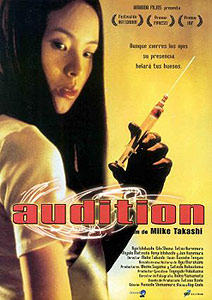
When I saw Takashi Miike’s Audition, I did not know that the sub-genre of “torture porn” existed in horror. As such I did not approach it as an exercise in sadomasochism. (It is not, anyway). As I became aware of creators like Eli Roth, and a rather embarrassing discussion on how he had GONE TOO FAR (!!!! etc.), it was clear that there was still a burgeoning market for transgressive horror pictures. The Last House on the Left, I Spit On Your Grave, The Hitcher, the work of Lucio Fulci all caused similar bother upon their release. Some of the above were innovative, exciting examples of the independent creative spirit existent in 1970s American cinema. Others were not.
In retrospect, created things nearly always appear more credible. They have had the benefit of countless revisionist cataloguers, writers, and fans who have spoken up and given these movies their fair due. It is sometimes hard to appreciate transgressive creation while it is happening, sometimes because it is meaningless, cynical shit, and sometimes because it is not comfortable to be the targeted audience in a taboo-breaking event.
My colleague Charlie M. recently wrote on the changing mores of the teenage audience, arguing for the importance and fun of deliberately illicit movies. In looking at the teenage crowd, it seems that the romantic, unashamedly female Twilight series has overtaken the lust for hard sex, gore, and death. It has made vampires something that a girl likes! Things that girls like do not = scary. An extension of Justin Bieber.
This is not intended as a direct retort to Charlie—who touches on some of the issues I do—but on the larger cultural rejection of Twilight and the claims that it has somehow castrated horror. This is not an uncommon view. Indeed author Neil Gaiman has expressed as much in an interview with The Independent in 2010.
“The saddest thing is that it runs the risk of making vampires not scary. I will be glad when the glut is over. Maybe they will be scary again. I like my creatures of the night a little nocturnal. My next big novel was going to have a vampire. Now, I’m probably not. They are everywhere, they’re like cockroaches. Maybe it’s time for this to play out and go away. It’s good sometimes to leave the field fallow. I think some of this stuff is being over-farmed.”
The author of another famous vampire series that was accused of being trashy, soppy, and too humanizing—Anne Rice—also expressed concern in an interview with George Stroumboulopoulos. Perhaps Stephanie Meyer has made a certain vision of vampires excessively profitable—at least for a time—but I find it very hard to believe that Twilight is interacting at all with horror in a meaningful way.
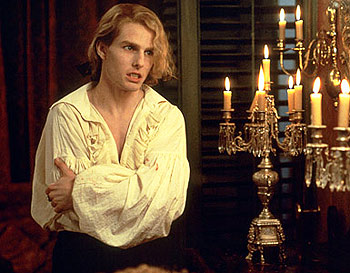
Tom Cruise in Interview with the Vampire
Twilight is not horror. One might as well criticize Harry Potter for failing to match the terror of The Exorcist. They are not in the same genre. They do not involve the same audience.
The Twilight series is firmly in the mold of the young adult fantasy novels of Philip Pullman (His Dark Materials), and yes, J.K. Rowling. Even more than those other series, Twilight is aimed at women. It may or may not be trash, but it succeeds or fails depending on how it speaks to its audience, and works within the escapist, growing-up mode which Pullman and Rowling made so compelling. When female persons of differing ages became entranced with Twilight—partly in film form due to Robert Pattinson—the conversation took a different turn from that of similar fandom experienced with Potter or His Dark Materials (the most subversive literature your children will ever read, by the way.)
The moaning from horror fans is just one part of it. Or perhaps a cover for something more insidious. It is less, I think, about Twilight negatively affecting the kind of horror being made, or the number of people wanting the kinds of exciting, transgressive experiences mentioned above—it has definitively not as we shall see—than it is about women having an offshoot of brilliantly exploitative genre fiction to call their own.
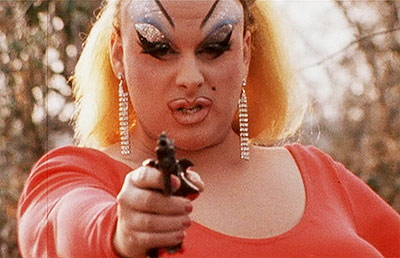
Divine in Pink Flamingos
This is not to denigrate such fiction. Trash—again, not meant negatively—can be liberating, cathartic, inspiring, and even wonderfully creative. Everything John Waters ever made is trash. Pink Flamingos, Female Trouble, and Hairspray are still part of the most original American cinema of the 20th century. (As an aside, Waters loves Justin Bieber.) Hello! Is that trash or is it treasure? I feel like I am in a goshdarn idiom! We know this. Yet folks still insist on getting offensively, embarrassingly “objective” in criticism for those things that are not meant for them, failing to see the inherent trashiness in those genre relics they hold dear.
Wishing for Twilight fans to instead have the thrill of say, scream queen Barbara Crampton’s exquisite ass, or the raging tit fest of anything Russ Meyer, is trying to make women have erections. Damn it, why don’t you get hard when I get hard? If Twilight is romantic porn for women, so what? Do you want me to direct you to a hundred essays talking about how important Russ Meyer was? I’LL DO IT GODDAMNIT! What Twilight certainly isn’t doing though, is interfering with the development of modern horror, or those kinds of transgressive experiences.
When I saw Wes Craven’s Scream at ten years old, it was one of the best movie experiences I ever had. I still think of how exciting it was and how for about an hour and a half, the whole world seemed to open up. Yes, every kid should have that moment when they step over the boundary and have a look at something they shouldn’t (should obviously; Scream was made for kids, for fuck’s sake). Twilight has nothing at all to do with this. There is little to no overlap between the audience who wants to watch Twilight and one who would have wanted to see The Exorcist with parents away, a couple of decades ago.
If you look at the development of transgressive horror, it has—if anything—increased in volume in the last decade. The success of The Human Centipede, A Serbian Film, Hostel, and the films of Takashi Miike are evidence of that. People are still expressing the desire to see fucked up shit done well on film, and it is getting produced. Can you imagine a studio refusing to bankroll a torture movie, because of the success of Twilight? Has this ever happened?
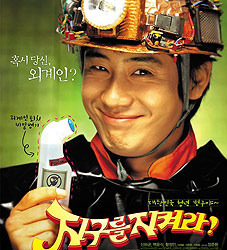
Save The Green Planet!
What is more, extreme horror has only gained more critical and public acceptance in the years since Craven had a woman bite off a man’s penis. A Serbian Film in particular was praised by some high profile critics for being a wonderful use of horror as social commentary. Audition is considered a classic by many. Watching Save The Green Planet! a beautiful, tragic movie filled with explicit torture scenes, sees a subgenre that has continued to grow up with its audience. Not one that has been infantalized by the success of a series of books for young women.
It may be possible to make an argument that middle of the road, good natured horror, in the mode of Nightmare on Elm Street or Halloween, is harder to find. This is not to do with 1) a demand for it or 2) the existence of Twilight. It is far more to do with the unwillingness of Hollywood to fund original, big budget horror that is not based off of already successful movies. See: the number of bad remakes of (mostly) good movies in the last 15 years.
There are notable exceptions. All of Quentin Tarantino’s work has been about capturing this youthful spirit. He did not turn from SERIOUS ADULT DIRECTOR FOR FOLKS WHO THINK CRIME DRAMA IS A CREDIBLE GENRE and then into a trash guy. He was always that guy. Shows up genre prejudice, not declining talent. Kill Bill Volume 1 & 2 are superb exploitation movies. So is Grindhouse. The former has found an audience precisely because it expresses the fun, humorous, life affirming spirit of great trash that people still crave. The latter has unfortunately not, much to the shame of genre snobs.
The brilliantly sparse Paranormal Activity—probably the greatest use of the “found footage” offshoot in existence—did the job without any blood, gore, or torture. And yet it scared people, and gave them a nice entry point for horror. Sam Raimi returned with Drag Me To Hell in 2009. Not extreme horror, but scary, well-acted, well shot, and very, very fun. Perfect for the young crowd. Evidence that a rating means nothing to a master of horror. Nothing.
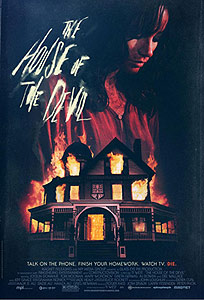
Ti West, a young talent sure to do great things, made the single best horror picture of the last decade. Also from 2009, The House of the Devil. Strong female character—played by Jocelin Donahue, a woman so compelling she could have replaced Adrienne Barbeau in anything—in an expertly paced horror story. Don’t say throwback; say classic horror. Tom Noonan makes the case for all good acting talent to get low and dirty.
West’s The Innkeepers, although not near the level of his earlier picture, is another good example of profitable, good natured, well-made horror for the younger audience member. This is to not even mention the existence of Masters of Horror, which saw the comeback of John Carpenter, with Cigarette Burns, and the greatest adaptation of a H.P. Lovecraft story, with Stuart Gordon’s The Dreams in the Witch House.
It is not then that young people are not having transgressive experiences. (One look at the number of self-made porn movies on the web from mostly average looking sorts, will put this to rest.) And it is not that young people aren’t having transgressive experiences in horror or that transgressive horror isn’t being made. And it is not that friendly, access point horror isn’t being made, though we could do with more of it. And it certainly isn’t that all of the above are not happening because young people are watching Twilight instead.
Women don’t get erect over Barbara Crampton. This is not a failing. Robert Pattinson is an attractive fellow, and a damn good actor to boot—see: Water For Elephants, Bel Ami, and David Cronenberg’s Cosmopolis; eat it up body horror fans. Twilight is not a conspiracy against horror or men. It’s what it feels like when genre fiction isn’t made for you. Grow up, or learn to love it. I don’t care which.
Time limit is exhausted. Please reload the CAPTCHA.